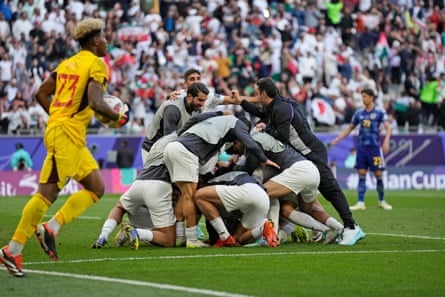I
South Korea has been nicknamed “zombie football” due to their ability to score four goals in added time during five Asian Cup matches. The determined Taeguk Warriors have struggled and persisted towards the semi-finals, with open arms ready to claim the trophy for the first time since 1960. Just when it seems like they are defeated, players like Son Heung-min, Hwang Hee-chan, or Lee Kang-in come through for the team.
Jürgen Klinsmann, the manager, appears content to give his top players autonomy. “Son is an exceptional leader and player and I have faith in his choices,” stated the German following their recent 2-1 victory over Australia in the quarter-finals, securing a match against Jordan on Tuesday. Although fans have doubts about the coach, they have confidence in the captain and are willing to support the team’s journey and await its outcome.
The Taeguk Warriors have not been particularly impressive, as they only managed draws against Jordan and Malaysia in the group stage. When Malaysia took the lead in the second half, the sight of a smiling Klinsmann was not well-received. Despite lacking a clear strategy or gameplan, Korea managed to defeat two strong teams, Saudi Arabia and Australia, in the knockout stages after narrowly avoiding elimination in the final 90 seconds of both matches.
The two matches followed a similar pattern: Korea falling behind and not posing much of a threat until the end. Against Saudi Arabia, the tying goal, which had been expected, was scored in the 99th minute. Against Australia, where a tie seemed less likely, it came three minutes earlier. Once both goals were scored, Korea took control and ultimately won through a penalty shootout against Saudi Arabia and a remarkable free-kick by Son against the Socceroos.
After that, there will be a meeting with Jordan, who were prevented from winning against Klinsmann’s team in the group stage due to a last-minute own goal. Korea should not be overconfident, but fans would appreciate a controlled performance and a comfortable victory. This may be challenging against a team that defeated an impressive Iraq 3-2 in a thrilling second-round match before eliminating the surprise team Tajikistan. Jordan’s coach, Hussein Ammouta, has had success in Africa and despite poor results leading up to the tournament, has built a strong team that is dangerous on the counterattack. Jordan thrives as underdogs and have nothing to lose in their first semifinal appearance.

In their last pre-tournament match, Japan suffered a 6-1 loss to a strong Japan team. It was unexpected that the losing team would outlast the winners in the actual tournament. Many had hoped for a final between rivals Korea and Japan, who are considered the top teams in Asia. However, Korea has been playing lackluster football while Japan has been easy to defeat. A loss in the group stage against Iraq exposed their weaknesses in defense, and they were rightfully beaten by Iran in the quarter-finals on Saturday. The Asian Cup was seen as a way to improve and potentially become a strong contender in the 2026 World Cup. While that may still be possible, it is uncertain if manager Hajime Moriyasu will lead the team to success.
Iran has emerged victorious in all five matches and are now welcoming back their key striker, Mehdi Taremi, who was previously suspended, for the semi-final match against Qatar. In the absence of Taremi, Sardar Azmoun stepped up and delivered a remarkable performance against Japan, with Roma’s forward also putting on an impressive performance. Brentford’s Saman Ghoddos has also been showcasing his talents on the field. Amir Ghalenoei, who did not make a great impression during his first stint as coach in the 2007 Asian Cup, was not the most popular choice to replace Carlos Queiroz. However, all will be forgiven if he is able to end their 48-year wait for the championship.
During the previous Asian Cup held in the capital city of Tehran, the Shah was in power. If they win this time, it would tie Japan’s record of four titles. Iran is a dominant force in Asian soccer and often feels undervalued. A victory against Japan would surely boost their recognition, as would reaching the finals.
Ignore the newsletter advertisement and continue.
after newsletter promotion
In the quarter-finals, Qatar narrowly defeated Uzbekistan in a penalty shootout with a score of 3-2, after the game ended in a 1-1 tie. Despite dominating the game, Uzbekistan’s tendency to falter in important moments was evident as they missed three penalty kicks. The final one was a perfect reflection of their performance, as Jaloliddin Masharipov aimed down the middle and handed the ball over to the opposing goalkeeper.
It was the kind of test Qatar, the hosts, probably needed after four fairly comfortable wins and their experienced players, who starred in the 2019 Asian Cup win, such as the winger Akram Afif and captain Hassan al-Haydos, will have to step up against Iran. With big crowds getting behind the Maroons, there is a real belief that they can go all the way again. To do so, somebody is going to have to find a way to kill those Zombie Koreans.
Source: theguardian.com


